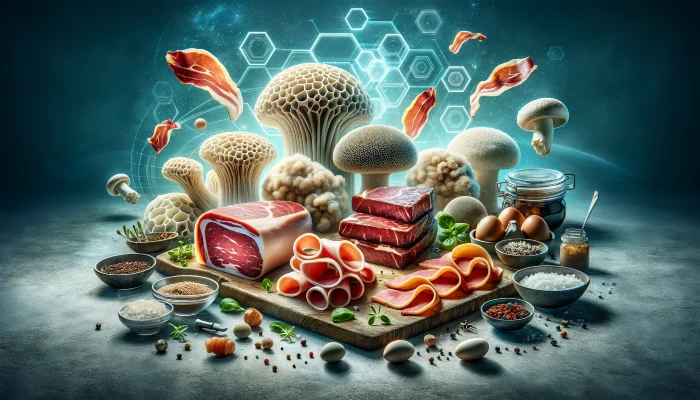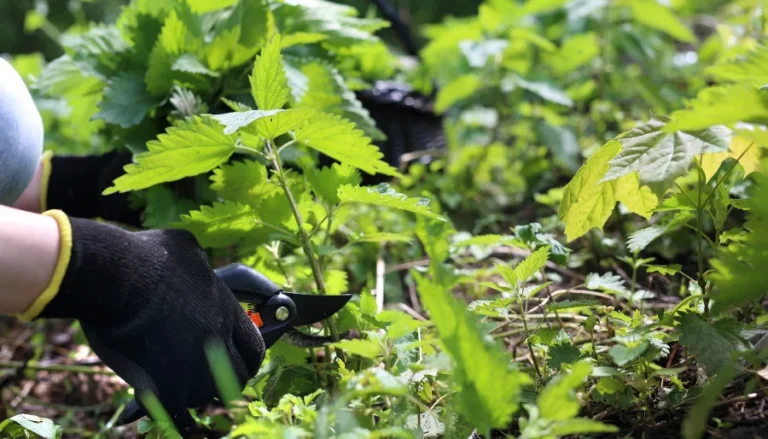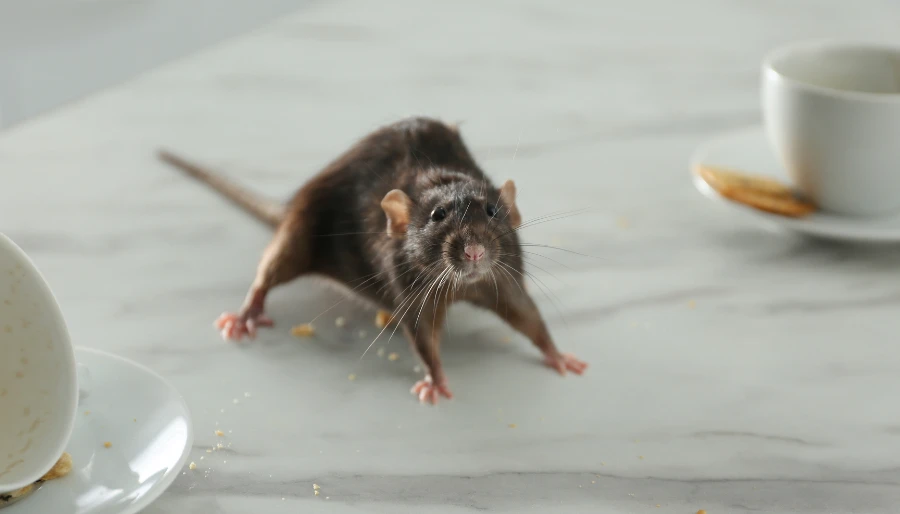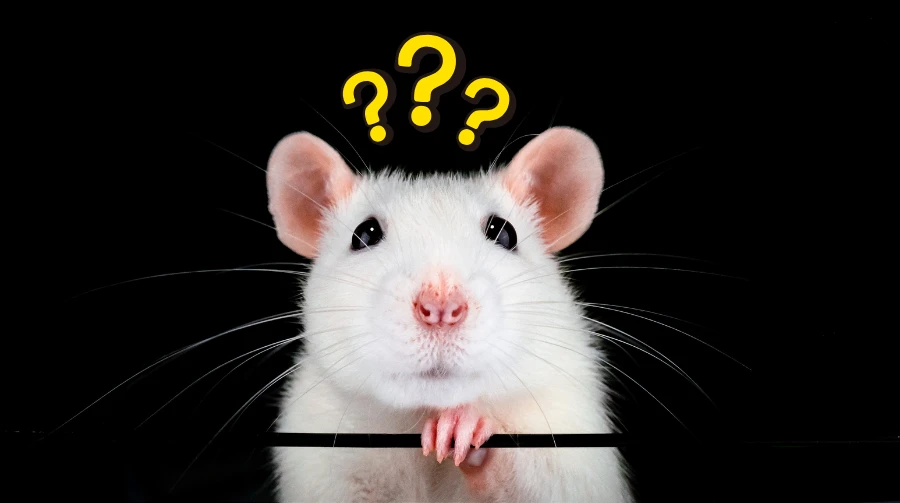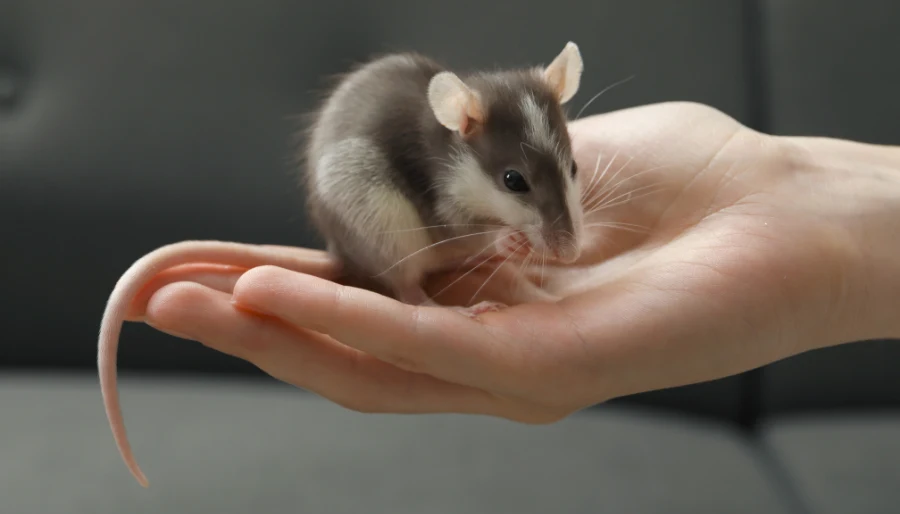Imagine a world where the steak on your plate, the bacon in your breakfast, and the deli meats in your sandwiches come not from animals, but from the roots of fungi. Welcome to the era of mycelium meat, where mycoprotein – a protein-rich food source cultivated from the root structure of fungi – is revolutionizing the plant-based food industry. With a legacy pioneered by Quorn, the mycoprotein market is now a burgeoning field of innovation, projected to hit a staggering $976 million by 2032.
These mycelium-based meats aren’t just about offering a plant-based alternative; they’re about crafting a future where food is sustainable, nutritious, and kind to our planet. Let’s take a closer look at some of the most groundbreaking brands in this space that you can buy, and enjoy, right now!
Meati: A Flavorful Upstart in Mycelium-Based Meat

In the picturesque city of Boulder, there’s a company that’s more than just a business; it’s a beacon of innovation in the plant-based industry. Meati, founded in 2015, isn’t just another name in the plant-based sector; it’s a pioneer shaping the future of food with mycelium. With their patented technology, Meati transforms mushroom roots into succulent, plant-based whole-cut meats, offering a variety that caters to various palates. From the classic and Carne Asada vegan steaks to the classic and crispy chicken breasts, Meati’s products are a testament to the potential of plant-based foods. Their products were so in demand that their February 2022 pre-order sold out in under 24 hours – a clear sign of the times.
But what truly sets Meati apart isn’t just their innovative products; it’s their commitment to sustainability and health. 95% mycelium, their classic chicken cutlet and whole-cut steak are supplemented with natural flavorings and juices, acacia gum, oat fiber, and chickpea flour, ensuring a nutritional profile as impressive as their taste. Their production methods are a stark contrast to conventional animal farming. With a new, large-scale production facility, Meati isn’t only scaling up to meet demand, but also doing so with an eye on sustainability.
Collaborations with AI company Pipa and renowned chefs like David Chang and Rachael Ray demonstrate Meati’s dedication to understanding and enhancing the health benefits of their products. Having raised $250M in funding, including an investment from Chipotle, Meati is a brand that’s not just making food; it’s making history.
Prime Roots: Redefining Deli with Koji-Based Mycelium

When Prime Roots burst onto the scene in 2017, they brought with them not just a new product, but a new perspective on what mycelium-based meats could be. Their secret weapon? Koji-based mycelium protein – a game-changer in replicating the texture and flavor of conventional deli meat. But Prime Roots didn’t stop at slices; they reimagined the entire deli experience with whole joints.
Their lineup is a gourmet’s delight – from various deli meats and charcuterie to hickory-smoked bacon. The attention to detail is evident in their whole cuts, including cracked pepper and smoked turkey, and a range of hams like smoked, black forest, and sugar shack maple. Their charcuterie range is equally impressive, featuring salami, pepperoni, and even more exotic offerings like black truffle patês and foie gras torchon.
Prime Roots’ innovation extends beyond meats. In 2021, they introduced a line of plant-based ravioli, claiming the world’s first vegan lobster ravioli – a bold statement in the world of culinary innovation. With a recent $30M Series B funding round, boosting their total financing to $50M, and a minor investment from mycoprotein giant Quorn, Prime Roots isn’t just expanding their reach and product range; they’re redefining what plant-based can mean in the deli and beyond.
MyForest Foods: The Art of Mycelium Bacon
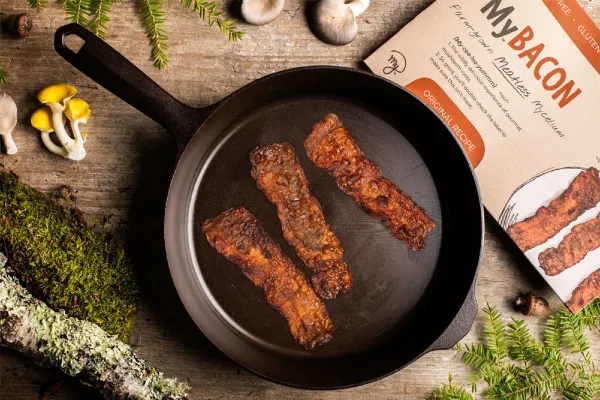
In the world of mycelium-based foods, MyForest Foods, initially known as Atlast Food Co in 2020, stands out as a beacon of innovation and sustainability. As an offshoot of mycelium trailblazer Ecovative Design, MyForest Foods isn’t just a brand; it’s a testament to the potential of fungi in revolutionizing our food system. Their flagship product, MyBacon, is a game-changer in the plant-based world, offering a whole-cut bacon alternative that’s not only delicious but also environmentally friendly.
The simplicity of MyBacon’s ingredients is where its true beauty lies. With just mycelium, salt, coconut oil, sugar, natural flavors, and beet juice for color, MyForest Foods demonstrates that great taste doesn’t require a long list of artificial additives. This Robert Downey Jr-backed brand takes a unique approach to growing its mycelium, using a special blend of woodchips, which allows the mycelium to be harvest-ready in just 12 days – a remarkable feat of agricultural efficiency.
Having raised $30M in funding, including a $15M Series A round in June, MyForest Foods isn’t just making waves in the plant-based sector; it’s reshaping how we think about sustainable food production. Their commitment to simple, natural ingredients and innovative cultivation techniques sets them apart in the crowded field of alternative meats.
Libre Foods: Precision Fermentation Meets Mycelium
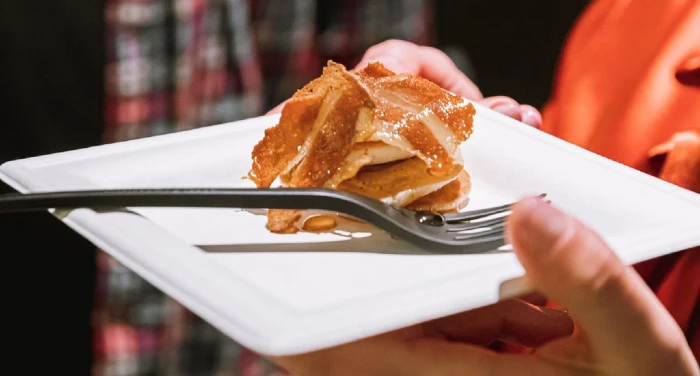
From the heart of Catalonia comes Libre Foods, a mycelium startup that’s not just following trends but setting them. Launched in 2020, Libre Foods has taken a bold step into the future of food with its precision fermentation process, a cutting-edge technique that creates fibers mimicking animal muscle fibers. This approach isn’t just about making plant-based alternatives; it’s about crafting foods that are indistinguishable from their animal counterparts in texture and taste.
Libre Foods’ journey began with bacon, but their ambitions stretch far beyond. In December 2021, they were poised to become the world’s first company to unveil a mycelium-based whole-cut steak – a milestone in plant-based innovation. Although bacon is their debut product, their vision encompasses a whole range of whole cuts, including poultry and seafood. This comprehensive approach to alternative meats reflects a deep understanding of consumer needs and culinary trends.
With a $2.5M funding round closed in April 2022, Libre Foods isn’t just expanding its product range but also its geographical reach, announcing plans to launch across Europe. Their commitment to precision fermentation and a diverse range of whole-cut products places Libre Foods in a unique position within the mycelium meat industry, poised to lead the charge in sustainable, plant-based culinary excellence.
The Better Meat Co.: Pioneering Rhiza Mycoprotein

In the evolving landscape of plant-based meats, The Better Meat Co., founded in 2018, emerges as a remarkable innovator, harnessing the power of mycelium to redefine meat alternatives. Their star ingredient, Rhiza mycoprotein, is a testament to the potential of mycelium in creating sustainable, nutritious, and delicious plant-based meats. Unlike traditional plant proteins, Rhiza is cultivated through fermentation, offering a meatier texture and a neutral flavor that’s a culinary chameleon, adapting to various dishes with ease.
The Better Meat Co.’s Rhiza stands out not just for its taste and texture, but for its astonishing nutritional profile. Boasting more protein than eggs, more iron than beef, and more fiber than oats, Rhiza is a powerhouse of nutrition, free from major allergens and GMOs. This commitment to health and sustainability doesn’t come at a premium price; the company aims to make Rhiza cost-competitive with chicken, already claiming it’s cheaper than beef.
As a B2B company, The Better Meat Co. has made strategic alliances, including with Perdue Farms for their Chicken Plus product and Hormel Foods for developing mycoprotein-based alternatives. Despite its impressive strides in the plant-based sector, The Better Meat Co. has been embroiled in a legal tussle with Meati over a proprietary mycelium harvesting technique since 2021, highlighting the competitive and rapidly evolving nature of this industry.
Infinite Roots: The German Biotech Trailblazer

Infinite Roots (formerly Mushlabs), a German biotech startup, isn’t just another name in the plant-based industry; it’s a pioneer reimagining the future of food. Using mushroom mycelium, Infinite Roots steps beyond conventional meat alternatives, tapping into the natural umami flavor of mushrooms to create a taste that’s strikingly like meat. Their journey, bolstered by their inclusion in the ProVeg Incubator, saw a significant milestone in 2020 with a $10M Series A funding round.
What sets Infinite Roots apart is their commitment to sustainability. By feeding mushroom cells with sidestreams from the agricultural and food industries, they’ve created a circular, eco-friendly process. This innovative approach not only reduces waste but also enhances the sustainability of their products. Infinite Roots isn’t just looking to create alternatives; they’re looking to revolutionize the entire category of meat substitutes.
With plans to develop a range of products including sausages, meatballs, spreads, and burger patties, Infinite Roots is poised to become a major player in the plant-based industry. However, they candidly admit that their products aren’t yet vegan, reflecting a transparency that’s as refreshing as it is rare in the food industry. As they continue to innovate and refine their offerings, Infinite Roots stands as a beacon of sustainable, flavorful, and ethical food production.
Bosque Foods: The German Innovator in Whole-Cut Mycelium Meats

Bosque Foods, another trailblazing German brand, is redefining the plant-based meat industry with its innovative approach to mycelium-based meats. Specializing in whole-cut chicken and pork filets and bacon, Bosque Foods employs solid-state fermentation, a technique that not only enhances the texture and flavor of their products but also aligns with sustainable food production practices.
Mirroring Mushlabs’ commitment to sustainability, Bosque Foods upcycles agricultural side streams, utilizing them as feed in a remarkably efficient 10-day harvesting process. This approach not only reduces waste but also minimizes the environmental footprint of their production.
The brand’s recent closure of a $3M seed funding round marks a significant step towards accelerating product development and commercialization. Bosque Foods isn’t just creating plant-based meats; they’re cultivating relationships with chefs and restaurants to bring their innovative products to a wider audience. Their 85% mycelium-based chicken cutlet, showcased at the Vegan Women Summit in New York City, is a testament to their dedication to quality and sustainability.
Adamo Foods: UK's Answer to Sustainable Mycelium Steaks
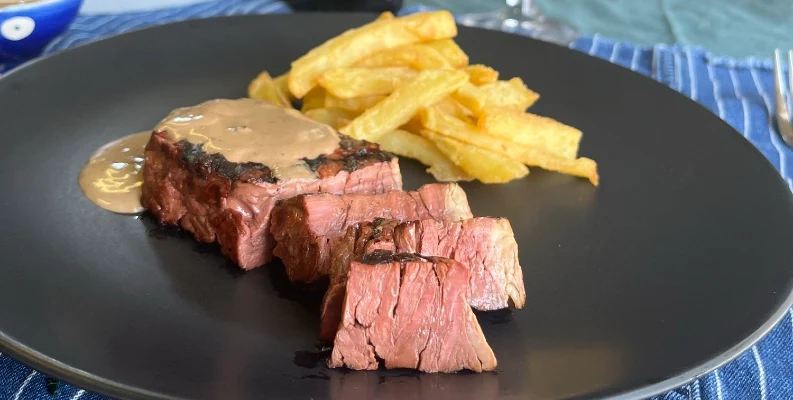
Adamo Foods, a UK-based startup, is making waves in the mycelium meat sector with its whole-cut mycelium steak. Securing $1.9M in fresh funding this June, Adamo Foods is at the forefront of a significant breakthrough in the texture of plant-based meats. Their innovative technique to grow mycelium into long, dense fibers creates a texture that mirrors the “grain” of a traditional steak or chicken fillet, bridging the gap between plant-based and conventional meats.
Adamo Foods’ mission transcends the realm of food innovation. With a focus on fighting climate change, improving global health, and enhancing food security, their approach to plant-based meats is holistic and impactful. Their commitment to keeping their products price-competitive with conventional meat is a critical factor in making sustainable food choices accessible to a broader audience.
With plans to release their steak and fillets later this year, Adamo Foods isn’t just a brand; it’s a movement. Their innovative techniques and dedication to sustainability position them as a key player in the future of food, offering a tantalizing glimpse into a world where plant-based meats are indistinguishable from their animal counterparts.
Of course, this list exists because one company, 39 years ago, took the chance and ventured into the mycelium market. Nearly forty years later, Quorn, based in Great Britain, has a devoted following.
Quorn: The Godfather of Mycelium-Based Foods

Quorn, the brand that pioneered the mycelium-based food industry, stands as a testament to the power of innovation and foresight in sustainable food production. Established 39 years ago, Quorn revolutionized the plant-based food sector by introducing mycoprotein as a core ingredient in meat alternatives. This legacy brand laid the groundwork for all the mycelium-based food companies that followed, making it the godfather of this burgeoning industry.
Quorn’s journey began with a simple yet profound idea: to create a sustainable protein source to feed a growing global population. Their mycoprotein, derived from a natural fungus, offered a solution with a lower environmental impact compared to traditional meat production. Over the years, Quorn’s product line has expanded significantly, now encompassing a wide range of options including meat-free mince, sausages, burgers, and even ready meals, catering to a diverse array of dietary preferences and culinary needs.
In 2019, Quorn was acquired by the Monde Nissin Corporation, marking a new chapter in its storied history. This acquisition by a major food conglomerate not only validated the importance of mycelium-based foods but also provided Quorn with the resources to expand its reach and impact. Today, Quorn products are sold across the globe, available in supermarkets and food outlets in numerous countries, making plant-based eating accessible and enjoyable for a wide audience.
More To Discover
Quorn’s legacy is beyond reproach in the flourishing mycelium-based food industry today. Brands like Meati, Prime Roots, MyForest Foods, Libre Foods, The Better Meat Co., Mushlabs, Bosque Foods, and Adamo Foods owe a debt of gratitude to Quorn. Without Quorn’s pioneering spirit and enduring commitment to innovation, the landscape of sustainable food alternatives would look vastly different.
As we reflect on the impact of Quorn and the burgeoning mycelium meat industry, it’s clear that the future of food is not just about taste and nutrition but also about sustainability and ethical consumption.







